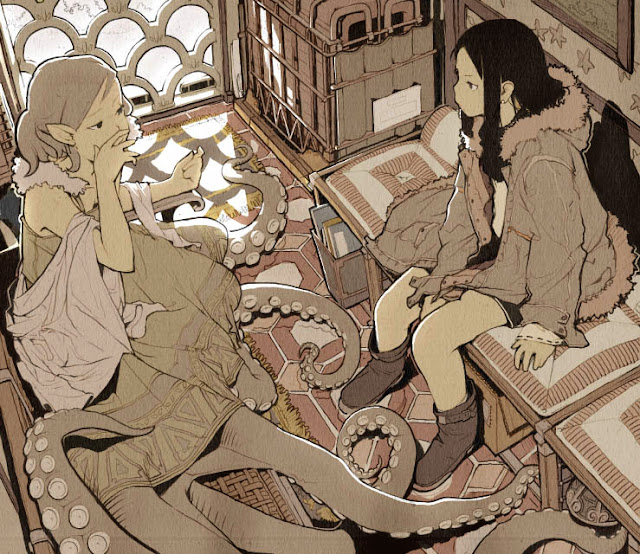In my admittedly rather limited exploration of the Buddhist canon, I recently came across the Therigatha, a collection of 73 poems in which the early nuns (bhikkhunis) recount their struggles and accomplishments on the road to enlightenment. The poems are organized into 16 chapters, with Chapter One consisting of one-verse poems, Chapter Two consisting of two-verse poems, and so on to Chapter 16 ("The Group of Great Verses").
Their stories are told with often heart-breaking honesty and beauty, revealing the deeply human side of these extraordinary women, and serve as inspiring reminders of our own potential to follow in their footsteps. But even more so, in reading the 2,500-year-old verses, we are witness to the very earliest birth of The Blues.
Forget the Mississippi Delta, forget West Africa - Robert Johnson and company are newcomers to the tradition compared to these women.
Consider this opening verse from the poem of
Vasitthi, the Madwoman:
Overwhelmed with grief for my son —
naked, demented,
my hair dishevelled,
my mind deranged —
I went about here and there,
living along the side of the road,
in cemeteries and heaps of trash,
for three full years,
Afflicted with hunger and thirst.
Or how about the song of
Punnika, the Water Carrier, challenging an upper-caste Brahman by the river?:
I'm a water-carrier, cold,
always going down to the water
for fear of my mistresses' beatings,
harrassed by their anger and words.
But you, Brahman,
what do you fear
that you're always going down to the water
with shivering limbs, feeling great cold?
Finally, someone really should set this wistful and beautiful poem by
Ambapali, A Former Courtesan, to music:
The color of bees, black was my hair
and curled at the tips;
With age, it looked like coarse hemp.
The truth of the Truth-speaker's words
doesn't change.
Fragrant, like a perfumed basket
filled with flowers;
With age, it smelled musty, like animal fur.
The truth of the Truth-speaker's words
doesn't change.
Thick and lush, like a well-tended grove made splendid,
the tips elaborate with comb and pin;
With age, it grew thin and bare, here and there.
The truth of the Truth-speaker's words
doesn't change.
Adorned with gold and delicate pins,
it was splendid, ornamented with braids;
Now, with age, that head has gone bald.
The truth of the Truth-speaker's words
doesn't change.
Curved, as if well-drawn by an artist,
my brows were once splendid;
With age, they droop down in folds.
The truth of the Truth-speaker's words
doesn't change.
Radiant and brilliant,
my eyes were like jewels;
With age, they're no longer splendid.
The truth of the Truth-speaker's words
doesn't change.
Like a delicate peak, my nose
was splendid in the prime of my youth;
With age, it's like a long pepper.
The truth of the Truth-speaker's words
doesn't change.
Like bracelets, well-fashioned, well-finished,
my ears were once splendid;
With age, they droop down in folds.
The truth of the Truth-speaker's words
doesn't change.
Like plaintain buds in their color,
my teeth were once splendid;
With age, they're broken and yellowed.
The truth of the Truth-speaker's words
doesn't change.
Like a cuckoo in the jungle flitting through deep forest thickets,
sweet was the tone of my voice;
With age, it cracks here and there.
The truth of the Truth-speaker's words
doesn't change.
Smooth like a conch shell, well-polished,
my neck was once splendid,
With age, it's broken down, bent.
The truth of the Truth-speaker's words
doesn't change.
Like rounded door-bars, both of them,
my arms were once splendid;
With age, they're like dried up patali trees.
The truth of the Truth-speaker's words
doesn't change.
Adorned with gold and delicate rings,
my hands were once splendid;
With age, they're like onions & tubers.
The truth of the Truth-speaker's words
doesn't change.
Swelling, round, firm, and high,
my breasts were once splendid;
In the drought of old age, they dangle
like old water bags.
The truth of the Truth-speaker's words
doesn't change.
Like a sheet of gold, well-burnished,
my body was once splendid;
Now it's covered with very fine wrinkles.
The truth of the Truth-speaker's words
doesn't change.
Smooth in their lines, like an elephant's trunk,
my thighs were once splendid;
With age, they're like knotted bamboo.
The truth of the Truth-speaker's words
doesn't change.
Adorned with gold and delicate anklets,
my calves were once splendid;
With age, they're like sesame sticks.
The truth of the Truth-speaker's words
doesn't change.
As if they were stuffed with soft cotton,
my feet were once splendid;
With age, they're shriveled and cracked.
The truth of the Truth-speaker's words
doesn't change.
Such was this physical heap,
now:
A house with its plaster all fallen off.
The truth of the Truth-speaker's words
doesn't change.















































